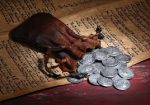 Vol. 2, No. 42 – 10-15-2017
Vol. 2, No. 42 – 10-15-2017
And Judas Iscariot, who was one of the twelve, went off to the chief priests, in order to betray Him to them. Mark 14:10
“Of all sad words of tongue or pen, the saddest are: ‘It might have been.'”—John Whittier, Maud Miller Pamphlet
Judas is a name in history that brings disdain to those who love Christ. Even as ruthless as Adolf Hitler was, Judas has a reputation that seems to surpass the un-likeability of Hitler. The treason of Judas is remembered as a dark hour in world history.
Judas was the treasurer of the group of the twelve called leaders who followed Christ. He could have been a Wall Street rising star, an investment guru. He could well have been a Roman tax attorney with no equal.
However, as money does in today’s culture, money corrupted him. The power gained from corruption bleeds over into a strength that has weakness as its outcome. Instead of thinking toward “what might have been” there are those whose thoughts lean toward “what can I get.” It is a self-eradication of character.
Today’s leaders need to carefully consider what their choices do to their character.
He was so far from surrendering to Jesus, he wanted Jesus to surrender to him; and when Jesus took His own way, the way of the Cross, Judas was so incensed that he double-crossed Him. The essence of sin is pride; the core of sin is independence; the heart of sin is the desire to do what we like and not what God likes. Notice the middle word of “sin” and “pride;” it is “I.”
He betrayed Jesus for a mere thirty pieces of silver; he did it with a kiss of death—it was a total obliteration of his outward character, but a revelation of the character of his heart
Why? He loved himself. He loved money. He was covetous. It is the same character deficit that brought on the death of the rich land and farm owner in Luke 12:20. It was a tragic waste of a life, destined for an eternity of separation.
There is something here to learn, is there not? How is our contentedness? Where is our knowledge, talent, skills, ministry, power in the Spirit—without the converted heart, what we have has no value, it is just stuff in our life.
Not only was Judas a skilled money-handler, he was a talented actor. He acted as a person he was not.
- He journeyed downward, along a slippery slope. He attempted to survive, but was caught up in the normal reactions of survival—everything was “fast and furious.”. Greed consumes.
- He found that it was a danger, in his own mind, to associate with Jesus. He refuses the grace and mercy that was a part of the character of Jesus. Sometimes we find bad people among the community of the church. Surprised? Just because someone is near a believer, near to hear of the Lord, does not produce likeness—required is a heart change.
- His thoughts became an act. Acts often result in fabrications. Fabrications become a habit. You do not have habits, habits have you. Habits mold your character and shape your eternity.
- His thoughts, perhaps, as he contemplated suicide, was upon the “ifs” of life. The question most likely still haunts him in that fiery place.
William Barclay says, “We shudder at Judas. But let us think again . . . covetousness, jealousy, ambition, and the dominant desire is to have our own way of things.” Thus, the crooner sings, “I Want It My Way.” Are we so very different—we need to be. We need to give attention to the things of life that would betray Jesus; for they still do.
Therefore, let him who thinks he stands take heed lest he fall. 1 Corinthians 10:12
Sittin’ by the Fire
When the frost was coming down and the wind was creeping up higher,he spent his time just that way,a sittin’ by the fire. Same old habit, day after day, he never seemed to tire. While others worked and built their classes he just sat there by the fire. When he died of slow degrees,some said, he went way up higher. But if he’s doing what he always did,he’s just a sittin’ around the fire.
